This is a post about building and sustaining communities, with particular focus on the competitive play scene.
The Looming Threat
No, this is not an article about Wamma and Florian’s stupid builder deck. This is about the other elephant in the room, the imminent arrival of Legend of the 5 Rings, and what it (broadly) means for the AGoT community.

She’s waiting to give the signal to overrun the thrones community
Later this year, L5R will be released. I’m really excited for it. I expect some (though by no means all) of you will also be excited for this release. It’s easy to get excited about new things, especially when they look as slick as what we’ve seen from the new L5R. The card art looks great, the mechanics look modernised, the game retains the rich theme of the previous edition. It remains to be seen whether the game will attract the same levels of devotion and loyalty as the AEG version, but from what I see now, there’s a high chance this site could become ‘Lion Clan Anonymous’ (or whichever of the clans end up with the boring monostrategic win condition / has a rubbish card pool).
Based on my own anecdotal observations, when FFG releases new card games, they tend to attract players that already play other FFG card games. While this in itself isn’t necessarily an issue (players can, and often do, play multiple games after all), more often than not, FFG games tend to cannibalise existing player bases. Players frequently cannot spare the money, or headspace to play multiple ‘lifestyle’ card games at a high level. Having spoken to people around the local gaming store, I can see L5R LAUNCHING with at least twice the number of players that we have painstakingly grown our AGoT scene to over 2 years. Obviously this is good for L5R, but is it necessarily bad for AGoT? I’d argue it probably is, for reasons I will articulate below. I think there are some reasons to be worried:
The LCG Problem:
The LCG model is excellent. It’s a brilliant example of a company choosing to revolutionise something that was taken as gospel. The LCG model is better for players and (presumably) financially worse for FFG, and I’ll always love them for that. Providing fixed distribution product means players are not being cynically milked for attempting to purchase what they need to play the game (I mean, seriously, what other product requires you to buy something without knowing what it is you are buying?). It removes the degenerate gambling aspect of randomised booster packs and the associated problems this can cause with players with addictive personalities. It also allows players to compete on a level playing field with access to the entire card pool, without a ‘pay-to-win’ model. This is simply THE BEST for competitive play, as it means we can find the best players rather than the best players with enough money, whilst also meaning that if the metagame changes you can just pick yourself up and adapt seamlessly, rather than having a situation where your expensive deck is now useless.
Whilst the vast majority of the LCG model is beneficial, it has a couple of important downsides, which are pertinent here. Firstly, for the longest of times, there have been no particularly easy ‘buy in’ products. Yes, you could argue that the core set is the buy in product, but I think that’s not ideal, particularly for AGoT. MTG is a pretty terrible game with an extremely player-unfriendly business model, but there are a few things that WotC does well. They provide free (yep) demo decks that stores can hand out to interested parties. They provide numerous entry level products, some efficient (starter decks/planeswalker decks, whatever they are called now) some terrible (Deck Builder’s Tool Kits), regular releases of pairs of decks designed specifically to be played against one another, out of the box. These products are available at a variety of price points, all lower than an FFG core set (regardless of game) and are an attempt to ease people into the hobby. FFG have FINALLY started over last year and this year to provide a kind of equivalent entry product in the form of the World Championship decks, which is good. The core set, on the other hand, is not as easy a sell. I appreciate that it’s supposed to provide a ‘game in a box’ for players but the AGoT one in particular is startlingly badly designed. Having now played a number of FFG’s LCGs, I am convinced that the AGoT starter set is uniquely poor. The Conquest one wasn’t good either, but it’s better than the AGoT one for reasons we will go into in a moment. The Arkham one is fine, but they all pale in comparison to the Netrunner core set, which is objectively and patently the most well designed.
For whatever reason, FFG have decided that the way they will make their money with LCGs is off the back of the competitive scene by making competitive players buy 3 core sets in order to have a complete play set of all cards. Never mind that this is annoyingly confusing to try to convince new players of the worthiness of the LCG model:
“All you need to do is buy each new expansion as it’s released, and you’ll have a complete set of every card in the game. Except for the core set, yeah, the most expensive one, you need three of those, sorry.”
Most of the core sets share similarities, a relatively shallow card pool for each faction in the game (apart from Necrons and Tyrannids in Conquest) plus neutral cards to pad these out. In the Netrunner core set, you actually have multiples of important cards. You can actually play the game with some consistency. It gives a relatively accurate portrayal of what the game plays like in general, is pretty balanced as a standalone product and teaches the mechanics of the game well. The AGoT (and Conquest) core set is full of one ofs which makes an already high-variance game a complete luckfest. It doesn’t give an accurate example of the game, and the AGoT set is particularly egregious in that the lack of multiples impedes teaching one of the basic mechanics of the game (duplicates). The AGoT core set rounds out by screwing competitive players even further by including singleton copies of important competitive neutral staples such as Put To The Sword and Tears of Lys while inexplicably containing two copies of Put To The Torch. I know plenty of competitive players in the Netrunner community who have played to a relatively high level without EVER purchasing a third core set (San San City Grid, Desperado, Aesop’s Pawnshop). I cannot say the same about Thrones where it is impossible to play competitively without 3 cores (functionally every card in the box).
The second part of the LCG Problem is the bloating card pool. If the joy of an LCG is having access to the entire card pool, the misery is a new player trying to catch up a year (or longer) after release. Having to track down all the different expansions (which float in and out of stock) is a large financial burden, and provides a non-trivial ‘activation energy’ to get in to the hobby. Whilst it is still normally much cheaper to buy in to an LCG than maintain an up to date Standard deck for MTG (let alone Modern etc), this presents an intimidating overall price tag for potential new players to get to grips with mentally. This problem could be solved by instituting a relatively quick rotation model (which would also have the added advantage of freshening the metagame, and removing some of the problem cards from the game more quickly). Unfortunately FFG have chosen a very poor timescale for their rotation policy, and should probably take a hard look at WotC. To its detriment, Netrunner has been out around 5 years at this point, and rotation STILL hasn’t come into effect, stagnating the game. Of course, by far the easiest, and frequently least expensive, option is to head for eBay to hoover up a complete (or largely complete) collection from a player moving on from the game. Sadly, while beneficial to the player, this is effectively net neutral for the community player base (one in, one out) and is a poor deal for stores, as they will not be selling as much product.
Speaking of stores, it’s worth thinking about how the LCG model affects them. If the easiest way for players to buy into the game is through eBay, it’s not a good incentive for stores to stock these games. While we’ve talked a little about rotation (or lack thereof) , the third part of the problem, SKU bloat is really rough. This affects Europe and the UK in particular a lot more than North America, but anywhere where population density is high, property prices and business rents tend to show a concomitant increase. This naturally results in smaller shop floors. Having a bloated game full of a huge number of SKUs is a pain in the arse for game stores and is another reason not encouraging them to stock the products we have come to love. In addition, the LCG model creates a huge amount of slow moving stock. After the week a datapack is released, it will no longer be very likely to move off the shelf. There is almost no reason for any player to buy a second copy of a particular datapack or expansion. After the initial purchase wave by local players, the next time the store might sell a copy of a datapack is when a new player picks up the game (and we’ve already discussed eBay). This means if the store over orders on these products, they can be left with dead stock functionally for ever. If you care about your local store (and you should, they provide an extremely important part of the competitive and non-competitive community) I would urge you to strongly consider preordering your LCG product from them, and not to shop around or buy elsewhere. This allows them to estimate as closely as possible how much of this product to order, which can be especially important when they may have to preorder product months in advance. The SKU bloat is particularly noticeable for X-Wing, which is a game currently with no concept of rotation, and products that are horribly over-packaged, to the detriment of both store floor space and the environment.
To summarise, if a player is choosing which to buy into, AGoT or L5R, from an economic perspective it makes sense for them to buy in to the game which has been going the shorter length of time, there are fewer products for them to catch up on. Additionally, players are likely to be less experienced overall, and so there will be less of a experience/skill gap for the new player to overcome.
Larger player base:
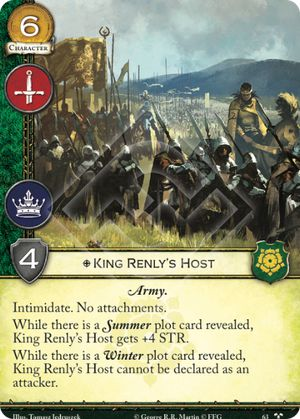
Traditionally, games with larger player bases have two major advantages, they are more visible, because more people are playing them. They also seem more attractive: “Wow, all those people sure seem to be having a great time over there, I wonder what they’re doing/playing, maybe I should get involved?” It is also a lot easier to find opponents so you can fit games in when you want to, especially as people get older with more real life commitments. It certainly looks like L5R will start off with a good size player base. Indeed, it has a larger player base it is likely to acquire from the previous AEG game, larger than the player base at the end of AGoT 1.0.
Similar Styles:
With the information we have been given so far, it looks like AGoT and L5R may end up being fairly similar games. Fundamentally they are both creature combat games, have multiple ‘planes’ of combat (challenge/conflict types) and look to share FFG’s common keyword and phase style game structure. I don’t think that Netrunner will be particularly heavily impacted by L5R, it is much more of a unique experience mechanically. I worry that on the other hand, L5R will be similar enough to AGoT that many players will elect to pick one, rather than play both. Anecdotally, I know many of the Thrones players I’ve met who started AGoT in 2.0 were ex-L5R players. A few of them confessed to be ‘killing time’ until the rerelease of Rings. The L5R community apparently prided itself on clan loyalty and being relatively close knit. I can easily see those players heading straight back to L5R. Some of the Conquest players I knew elected to just wait for L5R rather than get invested in Thrones. This is likely to be an unpopular opinion among Thrones players, but from a personal perspective I see some of the mechanics spoiled for L5R (notably I Go-You Go challenges and deployment, as well as the fate system, thinner deck sizes, elective draw built in to the game mechanics, spatial element) as providing depth and balance that at times AGoT lacks. The fate system in particular looks to offer a huge amount of additional depth in terms of player decision points, as well as providing an elegant solution to flooded boards that AGoT has been forced to bodge with blunt resets like Valar Morghulis.
‘Hotter’ IP:
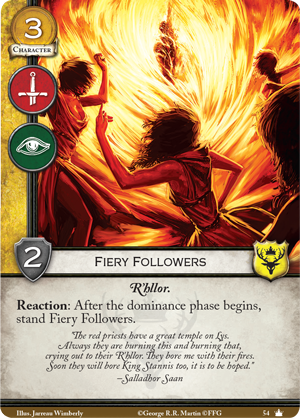
The L5R IP was purchased in entirety by FFG, at significant expense. Obviously they want and need this game to be a great success. Little Birds have whispered in my ear that, somewhat unsurprisingly, this will be FFGs largest launch for a game EVER. I’m not suggesting that the Thrones licence is under any sort of threat, but it was worrying to see Conquest curtailed by the degradation and eventual cancellation of the relationship between FFG and Games Workshop. There is no chance of this happening to a fully owned IP, and understandably it seems likely that L5R will receive a lot of peripheral support in the form of RPGs and boardgames etc, all of which will help attract players to the setting.
Poor Regional Attendance:
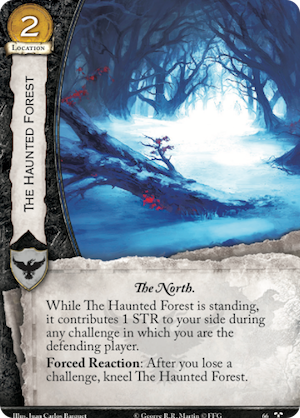
For whatever reason, we’ve seen some pretty low attendances for Regional events in some parts of the world. I may well have warped expectation on attendance levels due to the fact that I a) live in the UK and b) play Netrunner, where tournament attendance tends to be a lot higher. Perhaps some of these numbers are good for their particular area etc, but I can’t shake the feeling that a ‘premier’ regional level event should probably include more than 30 or so players. It’s a bit worrying to see these numbers when I’d hoped the game would be flourishing and coming in to its own.
Based on these points, I’m going to make the statement that the AGoT community desperately needs to attract AS MANY PLAYERS as possible, and do its UTMOST to maintain the ones that it already has.
(It’s as easy as) ABC
So, with that statement made, what can we do to improve the situation?
After spending much of my recent life playing competitive games (of a huge variety) I’ve developed a sort of theory for building communities, and will share it here. I think there are three main stages someone goes through on the route to having one of these games become an important part of their lives:
Point A – Awareness
Point B – Bought in
Point C – Competitive Play
These are fairly self explanatory, but it seems worth having a brief discussion. From a competitive player’s perspective, Point C seems to be the obvious ultimate goal. Getting someone to purchase the complete play set of cards, turn up to local play evenings and GNKs on a regular, preferably permanent, basis. They may also become enthusiastic about travelling to other places’ events in order to get more games in and compete more frequently, which helps sustain other communities as well.
Traditionally, the events I have run targeted at newer players have focused on getting players from Point B to Point C. Normally events, requiring a limited part of the card pool. For AGoT, these are normally single core set ‘Kingslayer’ events. Unfortunately, as discussed previously, the game out of a single AGoT core set is not very good. I’m certainly open to suggestions about other easily accessible formats for new players, hopefully this article will spark some discussion. It seems likely in future that I will move towards a ‘1 core-1 deluxe’ format, which has been the standard for introductory Netrunner events, though this works better due to the superior design of the Netrunner core set. The addition of the deluxe box, while increasing the entry requirement to the event a little for players, has the advantage of improving consistency in decks, and allowing players to express interest in a particular faction, which is particularly pertinent in AGoT and L5R which seem to have more restrictive deck building requirements.
However, I have come to realise that while these sorts of events are good for giving people a taste of Point C, allowing them to play in a more competitive setting, get some interesting games in and meet some of the local competitive community, a different type of event is required for getting people from Point A to Point B. Later this year (probably post Regionals season and post release of L5R) I’m going to try to run a ‘Learn to Play LCGs’ day at the local game shop. I haven’t quite worked out the exact itinerary, but I’m looking to have a number of ‘stations’ around the play space where people can just turn up, have a chance to look at each of the LCGs we play locally, and meet some of the community who will be able to give them a shortish demonstration of the games themselves. This will hopefully allow members of the public to be made aware of the products in a setting where they are being shown off by expert enthusiasts (probably with decks/scenarios built specifically for this purpose, and come away with some knowledge of the hobby, and potentially even picking up a core set (to Point A/Point A to Point B). I’m looking to feature Arkham Horror, Netrunner, Thrones and L5R. The rest of what we can do to get people to Point A is probably just be as visible as possible when playing our games, and enthuse about them if people look interested or ask. A lot is also up to FFG.
Chokehold
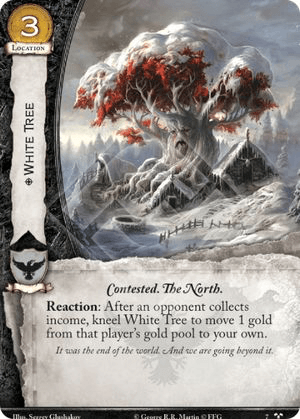
Player retention is a critical part of sustaining a healthy and vibrant community. So what can be done to encourage people to attend local events, and keep them coming back for more?
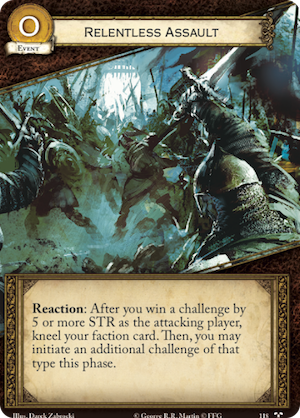
I think first of all, it’s important to keep the barrier of entry as low as is absolutely possible. As the game grows, the buy in price increases and becomes more off-putting, and it behoves us to make every effort to integrate newer players. For many players, the AGoT 2.0 facebook group may well be their initial portal into the wider community of the hobby. For this reason it depresses me whenever I see questions in this group get answered flippantly, or brusquely or even rudely.
Yes, it annoys me as much as the next person to see the same ‘can I dupe the Arbor on setup’ questions. However, I think it’s best to either ignore them, or just answer them as succinctly and politely as possible, in order to help new players, yes it’s tedious and a chore, please just accept it for the benefit of the game. Similarly, you may just be messing around with people you know very well in a public forum, but this group is enormous. Other people (especially new players) will not know if you have a preexisting relationship with someone you’re insulting or making fun of. On the surface, this can make the group look like an intimidating and unfriendly place. Likewise, off-colour jokes may be more acceptable where you are from or in your local group. It is highly unlikely they will be acceptable to everyone in the group – best to keep them to yourselves.
Anything that makes an already niche past time any more niche is going to increase the burden on new players, and make them feel more excluded. I appreciate ‘in-jokes’ are part of what makes these communities fun to be a part of, but I’d urge you if possible to try to avoid stuff that makes the community feel more exclusive. The hobby is dominated by white, middle-class heterosexual dudes. We are already missing out on large swathes of potential players through the intimidation factor of this alone. I don’t profess to be an expert at solving this problem, but I do believe it is a problem that needs to be solved. If you don’t care about this problem, or want to moan about ‘SJWs’ feel free to stop reading this site. I don’t want you here.
Here are some links written far more eloquently and by far more intelligent people than myself that I would urge you to read:
http://meeplelikeus.co.uk/busting-myths-around-sociological-accessibility/
http://rachel.we-are-low-profile.com/blog/the-average-uk-boardgamer/
https://en.chessbase.com/post/explaining-male-predominance-in-chess
Here is an example of a community fuck up by the Netrunners, the fall out, the response, and a perfect example in the resultant discussion thread of these problems and the difficulties the community has in acknowledging them and potentially resolving them to move forward (it is the source of some of the links above, and well worth a read if you are at all interested in presenting welcoming and open gaming communities):
https://forum.stimhack.com/t/representing-the-community-learning-from-the-european-championship/8970
As a final word for now on this subject, lewd and unnecessary alt arts will never help to provide a comfortable inclusive space for everyone.
Obviously the only players it is OK to offend are Greyjoy players. It’s for their own good after all! 😀
With a brief discussion about inclusivity out of the way, what can you do from an AGoT perspective to help new players and encourage them to continue playing?
I think one of the best things you can do is be helpful and friendly, particularly in more casual settings. Discuss choices and decision points openly, don’t dissemble, give information openly and with good grace. I personally believe this to also extend to tournament settings. You do not want to be in a position where players think: “Oh, these people were really nice when playing casually, but they changed for the worse when push comes to shove, I guess I just won’t bother coming to any more tournaments, they clearly aren’t as friendly”. There has been a lot of discussion recently about the amount of information to give opponents about total strength and board state, as well as whether you should be responsible for the trigger of the FORCED REACTION on YOUR OWN FUCKING LATE SUMMER FEAST. I hope that it should surprise no one who has met me that I come down on the side of ‘don’t be a bell end’. Sportsmanship is important, and it isn’t just about winning and losing with good grace (which encourages others to show good sportsmanship, and makes them want to spend time with you again), I believe it is also about treating your opponent with respect. I’ll post some points Wamma made in a discussion about this topic that I wholeheartedly agree with (edited by myself for style and for article clarification):
On the “help them out vs winning at all costs” matrix, there are four options:
1) You helped them out, they won, ‘what a shame’: Now they think you’re a nice person and the community is helpful, and will come back to more tournaments. You take a small hit that you might have taken anyway, and got beaten fair and square by the rules of the game and your opponent’s decision making. (GOOD FOR COMMUNITY BUILDING)
2) You didn’t help them out, they won: You come across like a massive dick and a total loser. GGWP. (BAD FOR COMMUNITY BUILDING)
3) You helped them out, you won: Awesome, you won, you did it through actually playing the game rather than dissembling and obfuscating, and they think better of you and the community because you managed to do it by not being a dick. (GOOD FOR COMMUNITY BUILDING)
4) You didn’t help them out, you won: Well done, you are clearly the greatest for using every trick necessary to squeak out a victory. Why does it matter if someone thinks you’re a dick if you got the PRIDE of winning a card game not by your skill but by your opponent’s unforced errors? Or were you winning anyway, in which case you might as well have been nice instead of turning someone away from the game? (BAD FOR COMMUNITY BUILDING)
I come from a science background. Consequently I believe in sharing information for the benefit of all to aid overall progression. Do deck breakdowns with people after you’ve played with them, show them how your deck works, discuss card choices. Chances are high that this will help clarify your own thinking, you can have extremely fruitful discussions about the relative merits of certain card choices, your deck will almost certainly benefit from it. POST YOUR DECKLISTS. The Netrunner community posts decklists immediately and frequently. It allows the decks to be iterated and improved extremely quickly to become the most efficient they can be. This results in the game being played at an extremely high level where player skill and decisions are paramount. It also gives new players an important leg up when entering the hobby so that they can concentrate on improving their play and understanding of the game, rather than be held back by inefficiencies that the rest of the collective community has evolved past. I believe the aim of the competitive scene should be to help these newer players improve AS FAST AS POSSIBLE. It gives you more competitive, competent opponents to test yourself against, test decks with, and just generally spend time with. I genuinely believe the lack of cooperation in the AGoT community is an embarrassment for it as a whole. The very best players will always be one step ahead, whether it be in tech card slots, reading the metagame or in decision making. It is then, in my opinion, sad that some feel the need so strongly to further hamstring others and harm the community to ensure victories they would have achieved anyway. Who knows, the players that you could have helped (but decided instead not to) may walk away from the game. They could have been the next master creative deckbuilder, they could have been the next person to start a podcast, or provide art assets, they might have been someone you enjoy taking road trips with, or sharing a post-tournament drink with, they might end up playing a tournament for the right to witness your wedding. If you don’t make them feel welcome, you might never have a chance to find out.
- Contribute, don’t degrade or erode.
- Help, don’t hinder or hide.
There are further mechanics that you can use to create additional reasons to come back time and again. Some anecdotes will be presented in the next section, but one of the most effective I’ve found is what I would describe as ‘Pass the prizes’. This takes the form of an item (typically of no real value) that confers bragging rights and loose prestige upon the holder until the next tournament where it is relinquished back to the prize pool. For our Conquest group we had an old Conquest playmat that the winner would be presented with every local tournament. They were allowed to sign it with a sharpie (Name, date, victorious warlord), and as the community flourished, it became a tangible record of the results of the events, the shifts in the metagame etc. Inexplicably for Netrunner, the prize is a bicycle bell (it has its own twitter account, and has spawned numerous inferior imitations). For AGoT we have a replica ‘Hand of the King’ pin for our local group, as well as a plastic child-size wrestling belt that I once took off Wamma in an embarrassing defeat for him at the Bristol Regional last year, probably my proudest moment in Thrones:
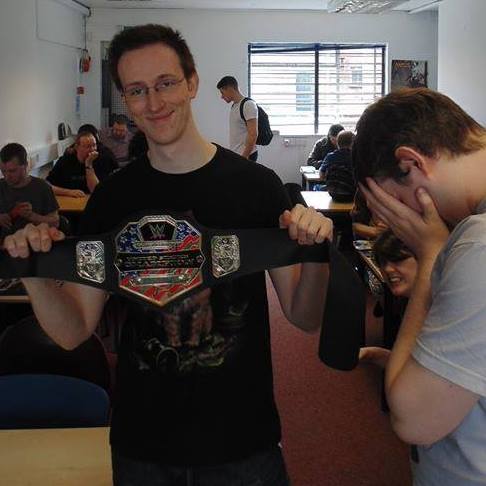
The moment he took it back still burns…
All this can present a fun set of mini-games and achievements aimed at fostering a sense of local community and fun. Additionally, where possible, provide participation prizes, so everyone goes home with something, no matter how small (the community has been great at this so far). Ensuring a prize structure which is not too top heavy, and focussed on the highly competitive players. These players will likely turn up anyway. What you REALLY don’t want to get to is a position where all the more casual or less competitive players have left the game, leaving nothing but a core of die-hards. In this situation it becomes almost impossible to attract new players to the game, as it becomes intimidating, and the learning curve is extremely challenging.
If possible, run events not strictly focused on competitive play. We have had good results in the past with ‘achievement’ based leagues, particularly in Netrunner, which can appeal to more casual players and more creative deckbuilders. Achievements were based on multiple things, including:
- Playing different identities (including underpowered ones (in AGoT, different House/Banner/Agenda combinations?)
- Achieving specific things in a single game, which often would require you to build specific decks. (Kill 4 characters in one phase that isn’t the plot phase; reduce your opponent’s reserve to X; Gain X power in one turn; Marshal 5 characters in one phase)
- Bounties on/handicaps on previous league champions (the Brighton Charity Joust handicapped UK National Champ Ryan Wood to raise money for charity).
- Encouraging people to play a certain number of games a week vs different league members.
This can be extended to tournament style events. There was a specific target to achieve each round in the Battle of Blackwater Bay event in the UK last year for example. Many events offer ‘best in house’ prizes to encourage faction diversity.
Another chance to taste the dream
There has been a huge amount of discussion about (often for years) about the state of FFG’s organised play prize support. At some point I’ll probably write a longer post about my views on the subject, but let’s cut to the chase, the recent sets of GNK prize support have been on a rapid downward slope, and the latest one was particularly dire (the Summoned to Court, Brienne, Tyrell tokens nonsense that is the Q2 GNK for Thrones). As someone who runs multiple FFG tournaments, this is quite galling. I’ve run events in my local area for Thrones 2nd Edition, Netrunner on and off, and Conquest when it was around, and I’ll probably end up running them for L5R on release. One of the things I’ve found is particularly important to sustaining a local community is to cultivate a group of players who are willing to travel to support your events. This helps on a number of fronts. For a start, it increases the number of attendees beyond your usual week-in, week-out local die-hards. This is not only an increase in raw numbers, but presents a new set of players to play against. Perhaps these players are running very different decks, and provide new tests of mettle for your locals, and the possibility of learning and experiencing new things. For the travellers, it creates an incentive for reciprocation, growing their own tournament scene. Soon, the community as a whole grows, and benefits, people make new friends, players get better as they play more frequently and the calibre of opposition increases, benefiting the community as a whole. Whilst I’ve never met anyone involved in an FFG game that played purely for the prizes (and I’ve played at a heavily competitive level in all 3 of the games), everybody loves free stuff, and particularly, they like to win prizes, even if they are ultimately just nerd status symbols:
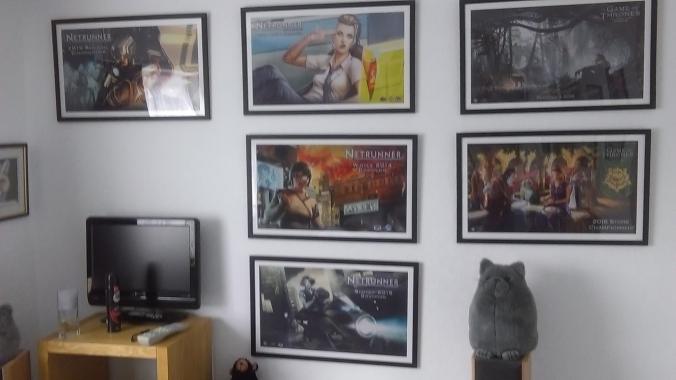
The chance to win prizes provides a further incentive to travel further afield and answer the question:
Tiggles, what is best in life?
-To crush your enemies, to see their inefficient decks driven before you, and to hear the lamentations of their prize kits.
The chance to saunter into someone else’s home town, smash them all over the shop and harvest their GNKs like an alt-art piñata is truly a satisfying feeling. On the receiving end however, it stings, it REALLY hurts, ladies and gentlemen. The shame penetrates your consciousness until you are aching for the next GNK to come around where you have a chance (however fleeting) to erase it. We sustained over a year of community based on this alone, where an Oxford Netrunner player (let’s call him ‘B’) turned up on a monthly basis, used our prize support like a strip mine, and then hopped on the train back to his stupid university town busy pumping out PPE graduates who are ruining Britain for everyone. Month by month, the Reading Netrunner players practised and improved, until we were finally able to defend our home turf, and the tyrannical reign of ‘B’ came to an end. This story became the backbone of the Reading-Oxford-Aldershot group of Netrunners, which is one of the central hubs of the game in the UK, and one of the closest-knit.
It’s particularly galling then, when doing the monthly ring-round, or making the Facebook posts, or messaging the group chat, to hear comments about how the GNK prize support is uninspiring, and people see it as no incentive to travel. Realistically, everyone is well aware that they will lose out financially when travelling to events (and this is in the UK, where there is a high population density with a correspondingly good density and frequency of events). Having prizes no one wants does not help. This Q2 OP kit for thrones was the most negative I’ve heard people about any of FFG’s prizes yet, with a resulting drop in attendance. It has sadly got to the point where I am genuinely wondering whether the local store should continue to purchase the GNKs for AGoT, and if the community can generate better quality prize support for a similar price (although the Regionals kit looks great). The other part of the problem is that stores are forced to order the GNKs months in advance, typically with no knowledge of the content. They cannot make choices based on full information. FFG have also decided not to continue with providing posters etc in the GNKs, which has made it more difficult (and put further onus onto TOs) to advertise events (Point A).
One of the things that the AGoT community has been particularly excellent with is community generated prizes, we’ve seen some extremely cool stuff in the form of tokens, playmats, plots, and other alt-arts, which seems to be a good hangover from 1st Edition. If you haven’t seen some of the really cool stuff people are doing with laser cutters, it’s definitely worth a look. I’d like to say a particular thank you to Patriot Games and Panda Post who provided prize support for the excellent charity event that was run in aid of Macmillan Cancer Support by Gabbi and Joe in Brighton earlier this year.
Beggar’s Banquet
This isn’t likely to be a common theme on this site, but I have a special request. One of our local Netrunner and AGoT players is from South Africa and is in the UK studying. He’s been made very welcome, and has been having a whale of a time getting involved in everything the UK competitive scene has to offer. He has been made aware that back home in South Africa the local community has been suffering, since they are struggling to get hold of FFG organised play kits of all levels. They are still looking to run South African Nationals, but he has put out a request for prize support donations to help support the Tournament Organisers there. The Netrunner community from across the world has been amazing, and have delivered a huge cache of additional prize support (some official, some community generated) which should sustain their events for a significant period of time:
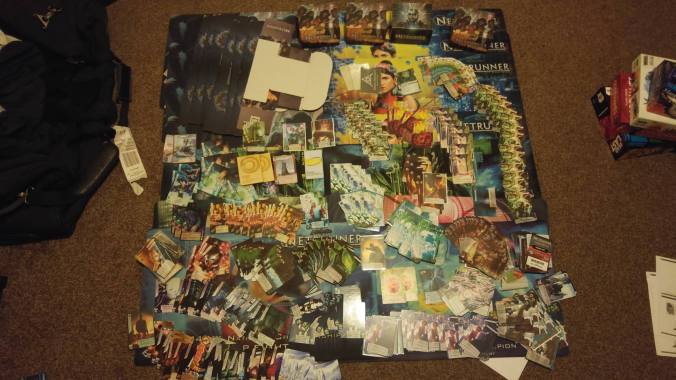
I’d like to extend that request to the AGoT community. If you have any leftover prize support, or stuff from your own personal collection you’d be willing to donate to sustain the growth of the game in other far flung places (from Ib to Asshai!), please contact me here or via facebook and I can put you in touch with him, or ensure the stuff gets to him, I know he’d be extremely grateful. Thanks.
Conclusions:
I definitely believe that L5R and AGoT can coexist, however I think it will be particularly important for the AGoT community to put its best possible face on in terms of romancing new players and holding on to those less tied to the game currently. Players come and go, 2.0 is young yet, it will be up to us to help maintain a trajectory of growth for the game (especially as it begins to blossom with a wider card pool in the ‘golden years’ of cycles 3 and 4 forward). Hopefully this article has provided some ideas and support for people looking to promote and sustain community engagement, which can, at times, be something of a dark art.








Great article!
LikeLike
Pingback: Initial Sparks – Hidden Library